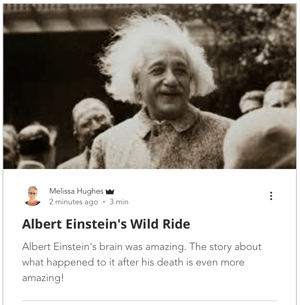Today, most of us carry a camera with us everywhere enabling the instant gratification of seeing every image we capture immediately. But back in 1944, smartphones didn’t exist. So, what's a dad to do when his 3-year-old daughter asks why she couldn't see the family vacation photo he had just taken?
Inspired by his daughter's curiosity, Edward Land, invented the Polaroid instant camera.There's no doubt that urge has led to ground-breaking discoveries. But, for many adults, curiosity is not just considered child's play, it's avoided.
Young children have an insatiable desire to explore and discover the world around them. They are incessant questioners, and they don’t worry what others will think about them not knowing the answers. But as children grow older, self-consciousness creeps in, along with the desire to appear confident and demonstrate expertise. As adults, the desire to project confidence, competence, and intelligence often stifles what is left of that childlike sense of curiosity.
While most of us aren’t dreaming up inventions that will change the world, there is a wealth of research confirming surprising cognitive and social benefits to nurturing a more inquisitive mind.
Curiosity Boosts Cognition
Studies show that curiosity is the foundation for learning. It may seem like common sense that when we are more curious about something, we are more engaged in it. But it’s more than just how much effort we apply. When we are curious about something, we learn at a deeper lever, learn it far more easily, and remember it far longer. That has everything to do with the regions of the brain that are activated as well as the chemicals released by that activity.
Researchers have found that when monitoring brain activity using an MRI machine, the area of the brain that regulates pleasure and reward lights up when the subject experiences a sense of curiosity. Furthermore, the area of the brain involved in the creation of memories, the hippocampus, also showed increased activity.
Simply put, the area of the brain that energizes people to go out and seek rewards is the same when we are curious. When this circuit is activated the brain releases a neurotransmitter called dopamine which naturally increases our capacity to learn. Also known as the reward and pleasure chemical, dopamine helps us decide how vigorously to work toward a goal, while also enabling us to learn from mistakes. Some neuroscientists describe dopamine as a “teaching signal,” like a coach who tells a player “good job” or “bad job” to encourage a desired outcome.
 Curiosity Strengthens Relationships
Curiosity Strengthens Relationships
Those who are curious about others are more likely to interact with people outside of their comfort zone. They are better able to consider diverse cultures, experiences, and world views. In addition, highly curious individuals tend to experience more positive interpersonal outcomes than the less curious in different social contexts as a function of the way they process stimuli during interactions with others.
One study asked subjects to engage in a process called “reciprocal self-disclosure” whereby strangers pose and answer personal questions. They found that people were rated as warmer and more attractive if they showed real curiosity in the exchange (while other variables like the person’s social anxiety and their levels of positive and negative emotions did not affect the partner’s feelings of attraction and closeness). This implies that demonstrating curiosity towards someone is a great way to connect with others.
Curiosity Improves Performance in the Workplace
Curiosity is often avoided in the workplace as many fear that it demonstrates an open admission to incompetence or a lack of knowledge. While leaders may claim to value inquiring minds, the vast majority of employees claim their organization neither welcomes nor nurtures curiosity. In one survey of more than 3,000 employees from a wide range of industries, 24% reported a sense of curiosity in their jobs on a regular basis and about 70% reported obstacles in asking more questions at work.
Swiss psychologist, philosopher and pioneer in cognitive development research, Dr. Jean Piaget, defined curiosity as "the urge to explain the unexpected."
However, curiosity can not only drive an organization’s performance, it can also improve engagement, team dynamics, problem-solving, and innovation. This is because the very essence of curiosity is to "explore the unexpected," we are less likely to be influenced by the confirmation bias and stereotyping that typically keep us trapped in existing thought patterns.
In one study, 200 employees working in various companies and industries received text messages at the beginning of the workday. Half of the employees received a text message that read, “What is one topic or activity you are curious about today? What is one thing you usually take for granted that you want to ask about? Please make sure you ask a few ‘Why questions’ as you engage in your work throughout the day. Please set aside a few minutes to identify how you’ll approach your work today with these questions in mind.”
The other half (the control group) received a message designed to trigger reflection but not raise their curiosity: “What is one topic or activity you’ll engage in today? What is one thing you usually work on or do that you’ll also complete today? Please make sure you think about this as you engage in your work throughout the day. Please set aside a few minutes to identify how you’ll approach your work today with these questions in mind.”
After four weeks, the participants in the first group scored higher than the others on questions assessing their innovative behaviors at work, such as whether they had made constructive suggestions for implementing solutions to pressing organizational problems.
3 Simple Ways to Nurture Curiosity
- Let your mind wander and wonder.
Most of us have busy days and full schedules. Make time every single day to let your mind wander about something that interests you. Even if you just take 15 minutes to ponder questions like “what would life be like without (fill in the blank of a special person, place, or thing)” or “what are you interested in that most people aren’t,” it will fuel your sense of wonder and spark your imagination. - Look for opportunities to be bored.
We live in an age of 24/7 digital stimulation. Visit a coffee shop or a park and disconnect from your devices. Just observe what you see, smell, and hear. Eavesdrop on conversations around you or read the body language of the people you see. Create backstories for these characters in your private novel. - Learn something new every single day.
Even if it is just a word you’ve never heard of or a restaurant you’ve never tried, committing to learning one new thing each day make you look for novel experiences. Change up your routine and pay attention to what you see. Even very small changes in your routine will engage your brain to notice things you’ve never noticed before and provoke curiosity. Take a different route to work. Shop at a different grocery store. Ask a coworker who you really don’t know well to join you for lunch. Exposure to different experiences is a fantastic springboard for inquiry.









